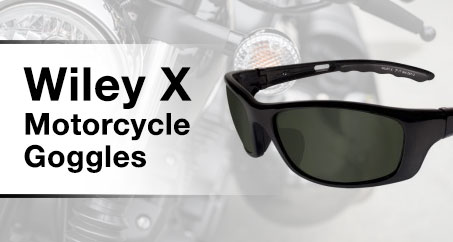7 Ways to Defog Your Motorcycle Glasses If You Don’t Have Anti-Fog Coating
What would you say is the most dangerous thing that can happen when riding your motorcycle? Potholes disguised as friendly puddles? Inattentive car-drivers trying to merge into your lane? How about lens fogging?  When your motorcycle glasses, goggles, or helmet faceplate fog up on the road, you have suddenly entered an incredibly dangerous experience. When riding, you rely on all your senses along with balance and control to keep you and your bike in your lane and safely away from other drivers. Even if you can see enough to maintain position, fog can prevent you from seeing other cars around you and environmental hazards like bits of blown tire that absolutely must be avoided. No matter where you are or where you’re going, lens fogging should be combatted at all costs.
When your motorcycle glasses, goggles, or helmet faceplate fog up on the road, you have suddenly entered an incredibly dangerous experience. When riding, you rely on all your senses along with balance and control to keep you and your bike in your lane and safely away from other drivers. Even if you can see enough to maintain position, fog can prevent you from seeing other cars around you and environmental hazards like bits of blown tire that absolutely must be avoided. No matter where you are or where you’re going, lens fogging should be combatted at all costs.
Causes of Motorcycle Glasses Fogging
When your motorcycle glasses, goggles, or visor fog up, this is always the result of varying conditions on one side of the glass or the other and is especially common during cold weather where the side facing your eyes is much warmer than the side facing the wind. However, the real problem is humidity, which is where the fog comes from. When motorcycle glasses fog, this is usually the result of a humid environment but with goggles and visors, it could easily be your own sweat evaporating and then re-condensing into fog on the inside of your lens.
The fact of the matter is that fogging is an unavoidable part of motorcycle riding. There will be variable weather conditions, you will probably sweat, and sometimes the simple drop in wind-chill when you slow down is enough to cause fogging. The real question is how you deal with it. You could flip your glasses or goggles off for a moment to air them out and crack your visor but we can all agree that the best solution is one that prevents fogging entirely through some kind of lens coating. If your motorcycle glasses don’t have anti-fog coating which is a common extra that can be bought with prescription lenses, there are a few remedies that can be used one application at a time, some more professional than others.
Before applying anything to your glasses lenses, first make sure they are completely clean. Otherwise, you risk scratching the lenses by rubbing in a piece of sharp grit without realizing it. Use lens cleaner and a microfiber or soft lint-free cloth (make sure the cloth is clean, too) or was gently with soap and water, then dry with a soft lint-free cloth. This will ensure that you’re treating clean lenses for the best possible visual clarity and anti-fog results.
1) Anti-Fog Spray
Anti-fog spray is the number one lens fog solution for more than just motorcycle rider. Skiiers who often wear scarves and end up breathing into their lenses use it, as to food service workers who are in and out of freezers and people who wear normal glasses in humid places like Florida swear by the stuff. All you have to do is spray the inside of your lens with the anti-fog spray and then wipe it clean with a soft microfiber cloth. Depending on the formula, this should keep you fog-free for anywhere between half an hour to five hours. Make sure to read online reviews, not all formulas work as advertised.
2) No-Fog Lens Cloth
If you’re familar with the faintly lemon smelling moist towelettes that some good barbecue restaurants give you to clean up after an enthusiastic meal, you’ll recognize the design of the no-fog lens cloth. These little towelettes are individually wrapped and carry what one can only assume is a similar solution to the anti-fog spray. Some also come in pre-treated multi-use cloths that need to be moistened before use. Simply wipe your lenses and you should be good to go.
3) Liquid Dish Soap
Out of your anti-fog spray and no-fog lens cloths? That’s okay, most homes have a little something you can use before heading out. Our first homemade anti-fog alternative is just a dab of gentle liquid dish soap. On clean lenses, rub a drop onto the surface of both lenses and give it a moment to dry. Then buff off the smudging just enough to provide visual clarity. This light coating should prevent fog from forming on your motorcycle glasses.
4) Toothpaste
This one may give you trouble, because you shouldn’t use the kind with bleach (“Whitening!”) or special crystals or gel streaks, just plain old normal kind-of-gritty off-white toothpaste. If you actually have some, put a little on a soft cloth and spread it around the surface of the lens, then rinse and dry them off without actually washing off all of the toothpaste. As a fun fact, this is an old scuba diver’s trick used on their big glass mono-lenses.
5) Shaving Cream
Another slightly gritty, creamy substance much like toothpaste and more likely for you to have available in your home, shaving cream is another potential stop-gap anti-fog material. Put a small amount on a soft cloth and cover the surface of your lens. Like the dish soap, give it a moment to dry, then gently buff away any smudging.
6) Baby Shampoo
Another gentle soap that will form a soft, invisibly flaky film when dry, baby shampoo is a surprisingly effective anti-fog treatment. Whether you have a baby or just baby-soft hair, take a dab and rub it onto your lenses. Once it’s dried, buff off the smudges and set out on the open road.
7) Potatoes
We’re not kidding. The way potato “juice” dries will effectively keep fog from building up on the inside of your motorcycle glasses. To work this magic, slice yourself a fairly small wedge of potato and rub the raw surface over your lenses and allow to dry. If there is any smudging, buff the lenses until clear and roll on with your spuddy anti-fog solution.
Of course, these solutions should only be necessary for people who don’t need prescription corrective lenses. If you do, rather than treating your motorcycle glasses every time before heading out, you can simply order a permanent anti-fog coating that will ensure that fog never forms on the inside of your prescription motorcycle glasses again. If not, unfortunately, special permanent lens coatings are not generally available for non-prescription lenses so it’s the potato for you, my friend.



Leave a Reply